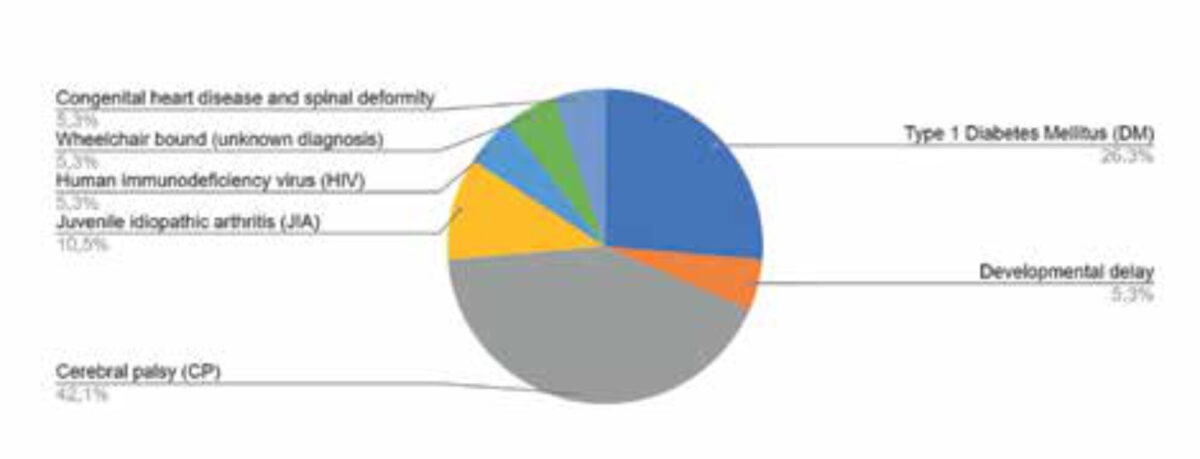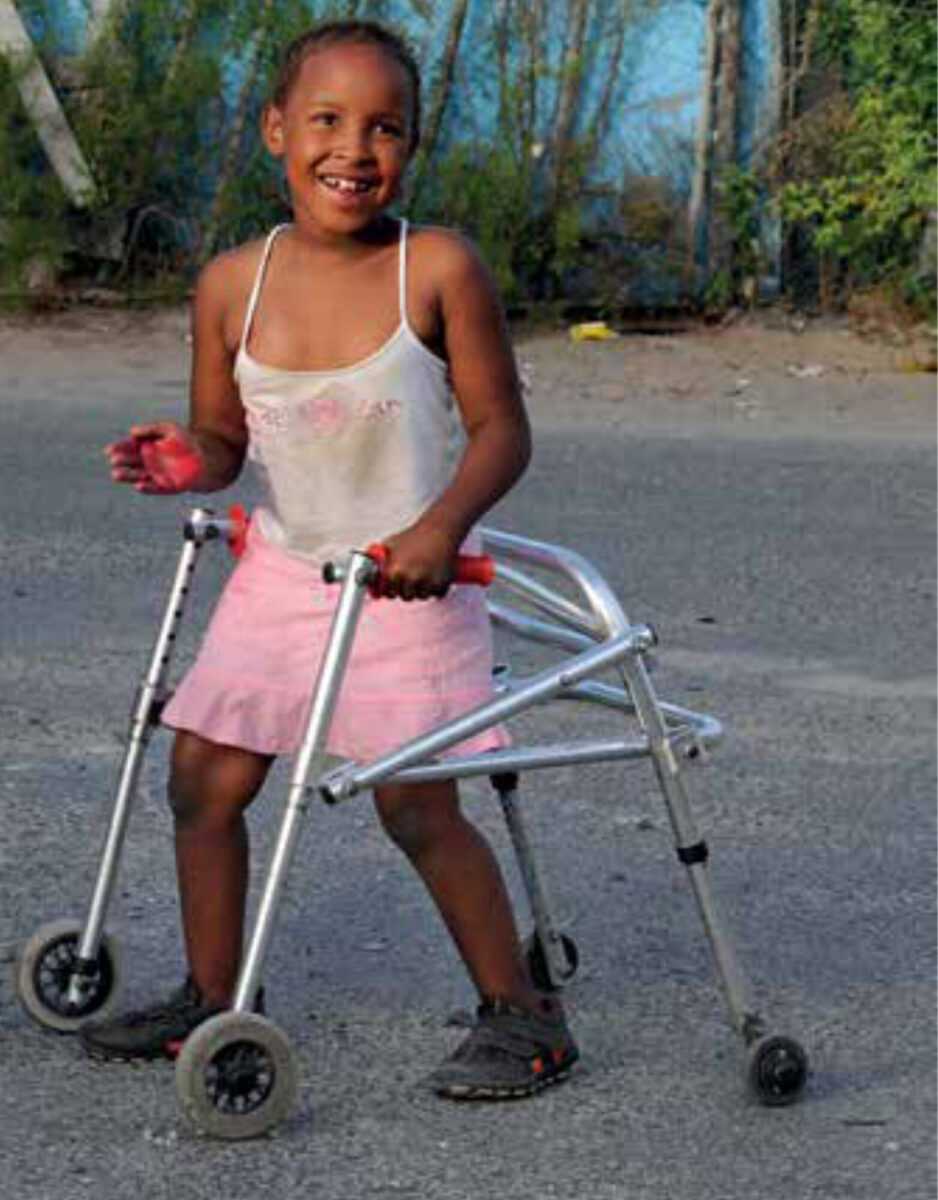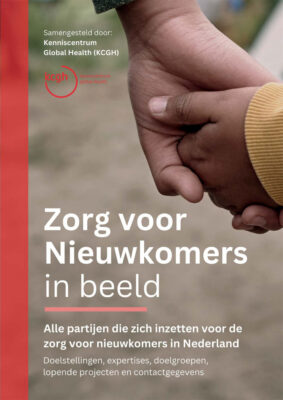Main content
Empowering and supporting guardians of children with chronic illness and/or disability in the Nkhoma Mission Hospital catchment area, Malawi
Background and rationale
Malawi is one of the poorest countries in the world. [1] In this low-income setting, with insufficient capacity in health and social support systems, children with chronic illness and/or disability are more disadvantaged and at higher risk of marginalization, malnutrition and dying at an earlier age. [2,3]
Though there is little data available, the 2015-16 Malawi Demographic and Health Survey reports that 29% of children between the ages of 2 and 9, and 16.5% of children between the ages of 5 and 17 have at least one specific functional problem or disability. [4]
Nkhoma Mission Hospital (NMH) is a rurally located 250-bed district hospital in southern Malawi, serving a large catchment area. It is unknown how many children with chronic illness and/or disability live in this area. NMH staff noted that informal caregivers (guardians) of these children are struggling to give them the necessary care. It was apparent that many children had not been attending follow-up clinics on a regular basis. A questionnaire conducted amongst staff suggested families of these children are more disadvantaged due to extra financial, physical and mental challenges. The overall increased burden of caring for these children falls mainly on women, who are insufficiently prepared for this role and have to meet the medical needs of their chronically ill child as well as taking care of routine household chores and providing other basic needs for the family. [5,6]
It is known that empowering and educating guardians will directly benefit the child. Studies show that the delivery of psychosocial interventions by non-specialist providers (such as guardians) may improve the child’s behavioural and developmental outcomes. [7] Unfortunately, there are no sustainable financial or educational programmes from NMH supporting these guardians.
Aim
To perform a situational analysis that explores the financial, physical and emotional challenges guardians face when caring for their chronically ill and/or disabled child.
Methods
A guardian was defined as a family member, relative or friend who was recognised as taking the main burden for the caring responsibility of the child at the household level. [8] Guardians of children with a disability and/or chronic illness attending the paediatric outpatient clinic or admitted to the paediatric ward were eligible for enrolment in the study. A cross-sectional survey was done using a locally designed questionnaire and semi-structured interview.
Results
A total of 19 children and their guardians were enrolled. Of these, 80% were the mother of the child and a further 10% the grandmother. Almost all reported earning money by farming or informal piecework. The overall chronic conditions and/or disabilities of the children are presented in graph 1.

Diagnosis and prognosis
Overall knowledge regarding the diagnosed disease of the child was poor, with 30% of guardians reporting to know little to nothing about the disease. Regarding prognosis of the condition, knowledge was limited to a few. Guardians of children with diabetes mentioned the importance of a healthy diet and dietary restrictions. On the other hand, those with CP children knew little about the prognosis and mainly reported worries about their child not being able to go to school.

Challenges faced and support received in caring for the child
All participants reported facing financial challenges, expressed in: lack of food for the child and themselves, lack of clothes, soap and/or shelter, not being able to buy (already subsidised) fertiliser and lack of transport money to the hospital. Multiple guardians reported being single or divorced, causing even more financial strain on the sole caretaker. Several guardians had difficulties in finding work, doing business or working on the farm due to the demanding care for the child. Interestingly, in response to the open-ended question of what challenges are faced when caring for the child, no guardians reported having any emotional or psychological challenges.
Unmet needs
When asked about non-financial support they would like to receive most, guardians most mentioned food, blankets, clothes and shelter (renovation). More than half the guardians of children with CP would like to receive something to help carry their child; two guardians would like help getting their child into school, and three other guardians would like to receive training in farming or rearing livestock to generate income.
Although no guardians initially mentioned the need for emotional or psychological support, all 19 reported being interested in meeting other guardians with children in a similar situation to “encourage one another”, “thereby reducing stress and worries”. This unmet need was further supported when asked what guardians would want if a project was to start, mentioning “women should share knowledge”, “teaching each other how to care for sick children”. “We should be united” and “learn from each other on how to do business”.
Furthermore, all guardians reported that more information about the child’s condition would be beneficial: to “learn new things about the child’s condition” and that “life could only change for the better” as “we feel things were not well explained to us”. In addition, all guardians wanted to receive information regarding hygiene practices, to “prevent disease” and “take better care of the child.”
Discussion
Due to the lack of well-developed health care and social welfare services, Nkhoma, like other places in Malawi, depends on informal caregiving to provide support for its chronically ill and/or disabled children. Most of the participants with this role were female and the mother of the child. This gendered labour division is due to the well-established cultural and societal norms of gender roles and expectations in the Malawian context. Moreover, mothers feel that this caring responsibility cannot be left to anyone else, as they view the task as ‘inherently theirs’. [8] In our study, poverty was so serious it was the main issue raised by all participants. Consequently, the main challenges faced in the everyday care of their child were basic challenges, such as obtaining enough food or having adequate shelter. It was noted that most children with CP had chronic malnutrition and that guardians of children with diabetes highlighted the importance of adequate food intake, while also mentioning difficulties in finding food. Nutritional support would be especially useful for these subgroups. [2,9]
The demanding full-time caregiver responsibilities, confining a guardian to their home to take care of the child, are coupled with difficulties in accomplishing economic responsibilities. The time contributed to providing care thus creates a major time burden, exacerbating poverty amongst already previously poor caregivers. [10,11] Furthermore, the financial support received was non-existent or highly unreliable, exacerbated by many caretakers being widowed or single without an independent income. Multiple guardians reported that the extent of impoverishment directly influenced their health-seeking behaviour. Assisting guardians financially to ensure hospital visitations to access help for their child and address this stressor would seem beneficial. [12]
Awareness of the child’s condition was generally poor. A lack of knowledge on managing symptoms associated with chronic disease and disabilities is an important factor known to lead to stress in a caregiving situation. [8,13] In low-resource settings like Malawi, where basic medical care is limited and specialist services unavailable, education regarding the disease, managing symptoms, and prevention of possible complications is especially important. All guardians wanted health and hygiene education.
Involvement in such extensive care for loved ones unsurprisingly results in substantial physical and emotional stress. [10,11] Interestingly, overall emotional or psychological challenges were not reported as a priority challenge but only indirectly suggested to be an issue when asked what benefit would be gained from meeting other mothers in a similar situation. Increased social support has shown to positively correlate with the life satisfaction of caregivers with children with disability. [14,15]
A better understanding of caregiving challenges and the unmet needs of guardians can inform the design of targeted interventions aimed at supporting, educating and empowering them: a gap that currently remains unfilled.
Recommendations
We would recommend using the results from this situation analysis to advocate and plan for services for guardians of children with disabilities and/or chronic illness in terms of:
- Educating guardians regarding the condition of their child, including the prognosis and possible complications of the disease
- Providing guardians with financial support for transportation and consultation costs to improve health seeking behaviour
- Providing nutritional education and support, especially for the guardians of children with diabetes and CP
- Giving guardians education regarding hygiene
Additionally, since most of the children and guardians included in this study visit the NMH paediatric outpatient clinic on a regular basis, we would recommend:
- Developing a database of children that frequent the paediatric clinic, identifying the types and number of impairments.
- Gathering more information regarding the demographics of the guardians, including: age, marital status, number of children in the household, educational level and monthly income.
- Clustering guardians of children with specific conditions to come on a given day, which would allow targeted educational training regarding their disease and prognosis
- Informing and assisting guardians in applying for social welfare services available to them.
- Disability should be included in the curriculum for training of all health workers
References
- National Statistic Office. Malawi Population And Housing Census Report. 2018.
- Groce N, Challenger E, Berman-Bieler R, Farkas A, Yilmaz N, Schultink W, et al. Malnutrition and disability: unexplored opportunities for collaboration. Paediatrics and International Child Health. 2014; 34(4): 308-314, doi: 10.1179/2046905514Y.0000000156
- Lelijveld N, Groce N, Patel S, et alLong term outcomes for children with disability and severe acute malnutrition in Malawi. BMJ Global Health 2020;5:e002613.
- National Statistical Office. Malawi Demographic and Health Survey 2015-16. Natl Stat Off DHS Progr [Internet]. 2015;1-658. Available from: http://dhsprogram.com/pubs/pdf/FR319/FR319.pdf
- Munthali AC, Tsoka M, Mvula P, Milner J. A situation analysis of children with disabilities in Malawi. Univ Malawi, Cent Soc Res [Internet]. 2013:1-45. Available from: https://www.medbox.org/a-situation-analysis-of-persons-with-disabilities-in-malawi/download.pdf
- Oxfam. Measuring Unpaid Care Work in Household Surveys What Is This Study About? 2018;8. Available from: www.oxfam.org.uk/policyandpractice
- Reichow B, Servili C, Yasamy M.T., Barbui C, Saxena S, et al. Non-Specialist Psychosocial Interventions for Children and Adolescents with Intellectual Disability or Lower-Functioning Autism Spectrum Disorders: A Systematic Review. PLOS Medicine. 2013.
- Tarimo ED, Kohi TW, Outwater A and Blystad A. Gender Roles and Informal Care for Patients with AIDS. A Qualitative Study From an Urban Area in Tanzania. Journal of Transcultural Nursing. 2009. 20(1); 61-68.
- Kerac M, Postels DG, Mallewa M, Jalloh AA, Voskuijl WP, Groce N, et al. The Interaction of Malnutrition and Neurologic Disability in Africa. Seminars in Paediatric Neurology. 2014; 21(1):42-49. ISSN 1071-9091, https://doi.org/10.1016/j.spen.2014.01.003.
- Chimwaza AF and Watkins SC. Giving care to people with symptoms of AIDS in rural sub-Saharan Africa. AIDS care: Psychological and Socio-medical Aspects of AIDS/HIV. 2004; 16(7): 795-807.
- Akintola O. Defying all odds: coping with the challenges of volunteer caregiving for patients with AIDS in South Africa. Journal of Advanced Nursing. 2008;63(4):357-365.
- Kilburn K, Handa S, Angeles G, Tsoka M, Mvula P. Paying for Happiness: Experimental Results from a Large Cash Transfer Program in Malawi. J Policy Anal Manag. 2018;37(2):331–56.
- Dambi JM, Mandizvidza C, Chiwaridzo M, Nhunzvi C, Tadyanemhandu C. Does an educational workshop have an impact on caregivers’ levels of knowledge about cerebral palsy? A comparative, descriptive cross-sectional survey of Zimbabwean caregivers. Malawi Med J. 2016;28(4): 167-173.
- Gebeyehu, F., Sahile, A., & Ayalew, M. Burden, Social Support, and Life Satisfaction Among Caregivers of Children With Intellectual Disability: The Case of Felege Abay and Shembt Primary Schools, Bahir Dar, Ethiopia. International Quarterly of Community Health Education. 2019; 39(3):0272684X1881997. doi:10.1177/0272684×18819974
- Bunning, K., Gona, JK., Newton, CR., Andrews, F., Blazey, C., Ruddock, H, et al. Empowering self-help groups for caregivers of children with disabilities in Kilifi, Kenya: Impacts and their underlying mechanisms. PLOS ONE. 2020;15(3):e0229851. doi:10.1371/journal.pone.0229851



















































